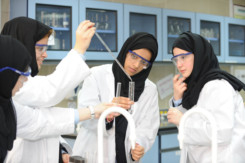
Abu Dhabi: Innovation centres, contests to recognise budding scientists and standards to assess schools’ levels of creativity promotion — these were some among a slew of programmes launched today (March 3) in a bid to develop and sustain a knowledge-based economy in Abu Dhabi emirate.
The initiatives were announced by the emirate’s education sector regulator, the Abu Dhabi Education Council (Adec), as part of its strategy to create a culture of innovation.
“We need to equip our children with the drive to innovate and be visionaries in their respective fields, and this journey should begin at school,” said Dr Amal Al Qubaisi, director-general at the Adec.
“We are therefore introducing a comprehensive plan that will establish a focus on innovation and critical thinking through all grade levels at school, and also links with industry and communities,” she added.
As part of the initiative, three innovation centres that feature specialised labs will be developed from the start of 2016 onwards. The labs will introduce children to technologies and processes that underpin major strategic industries in the UAE, including clean energy, aviation, space technology and robotics.
Dr Amal said the labs will be located in Abu Dhabi city, Al Ain and Al Gharbia to cater to pupils in each of the three regions of the emirate.
“We want pupils to connect with industry leaders through these centres and be inspired to take up similar mantles in the future,” she said.
During biennial Adec inspections, schools, too, will be assessed on how well they encourage innovation among pupils. These innovation barometer scores will be published so parents can use it as a criterion when selecting institutions for their children.
“Schools that promote creativity are much more likely to have high standards of education, so this is an important factor to consider. And because the results will be published, schools will be incentivised to raise their standards of innovation,” Dr Amal told Gulf News.
At the same time, an emirate-wide science competition will be launched across schools this year, and it will encourage pupils to use their scientific, engineering and mathematical skills to solve real-world problems.
“The contest is being organised in partnership with a 51-year old international contest in Ireland and, for the first year, it will be held at an emirate-wide level. In future years, we hope to widen the contest to all schools in the UAE, and winners will go on to compete with international participants,” Dr Amal said.
In addition, schools will be encouraged to develop innovation clubs that organise regular science experiments and research activities. Meanwhile, Adec will designate trained innovation leaders among the faculty or staff in each school. These individuals will essentially supervise and promote related activities at their institutions.
Dr Amal also encouraged members of the community to participate in school-based science projects and research opportunities in the role of science ambassadors.
In the meantime, the Adec is working to restructure the IT curriculum at schools so that it links closely with other subjects and enables children to use technology when looking for solutions to real-world problems.
“The eventual goal is that we develop creative individuals who are well-connected with the industries they wish to enter, and that industry executives not only mentor these children but also give them room to innovate once they have finished their education,” the director-general added.












